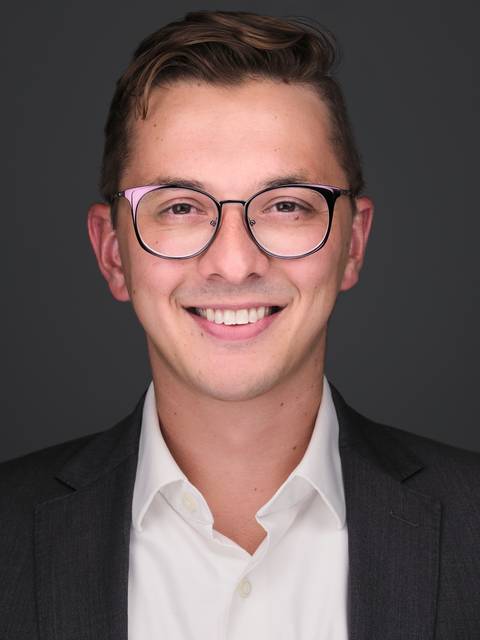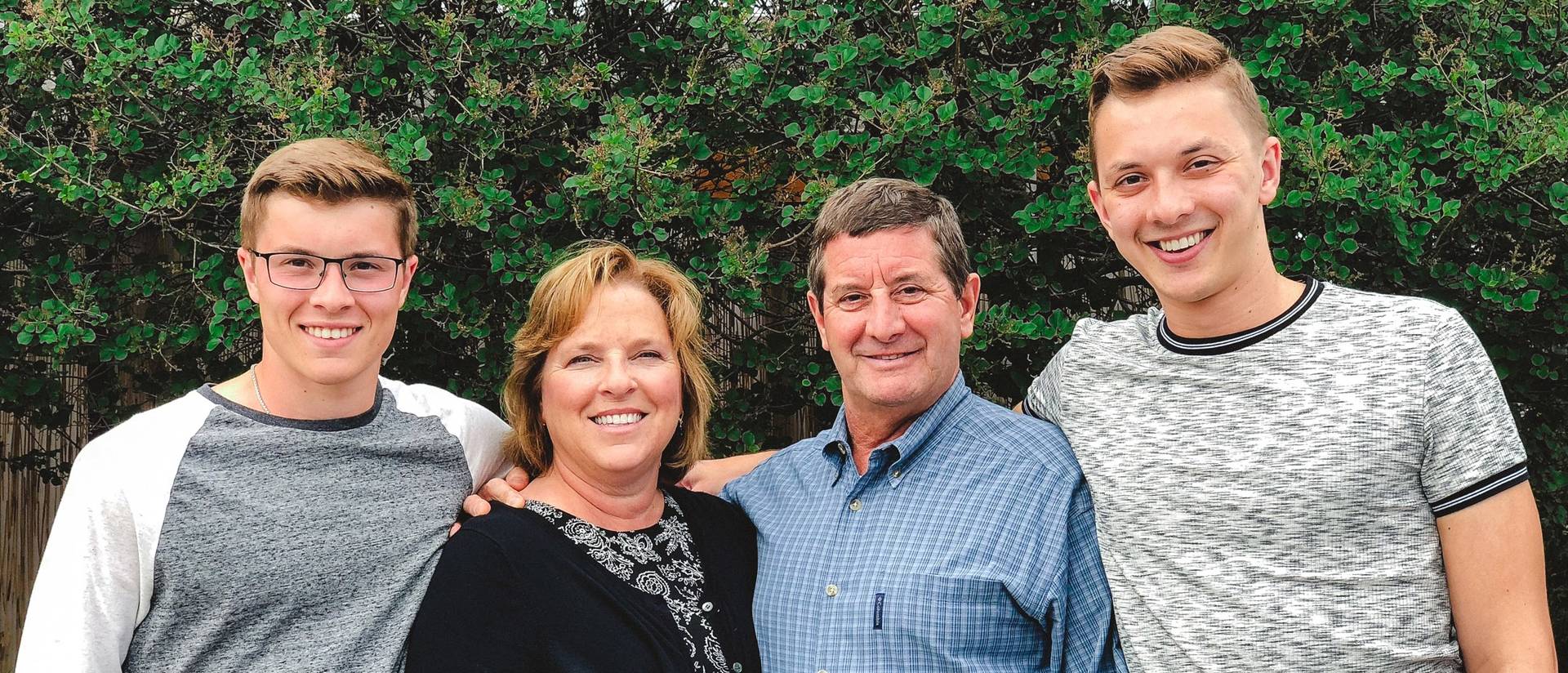Photo caption: Pictured above, from left, are Jacob, Beth, Lawrence and Alex Brown. Alex, a 2016 graduate, has established a forensics fund and scholarship through the UW-Eau Claire Foundation and provides ongoing financial support to the university's Civil Rights Pilgrimage. (Contributed photo)
Most people don’t know what they don’t know. How could they? It isn’t until they have educational and cultural experiences — ones that really challenge their thinking – that their beliefs take shape and values solidify.
That is exactly what happened to Alex Brown, a 2016 actuarial science graduate, throughout his time at the University of Wisconsin-Eau Claire.
As a high schooler in St. Michael, Minnesota, Brown admits he didn’t give a whole lot of thought to the diversity around him. In a small city where most people appeared to look the same and had similar backgrounds and upbringings, even the 45-minute trip to Minneapolis felt like a huge cultural experience. So, when Brown was convinced to attend UW-Eau Claire for the great forensics program, he wasn’t expecting much change.
However, it was that forensics program that started to widen Brown’s lens. The team clearly comprised a variety of students from diverse hometowns, backgrounds and experiences.
“I noticed the things my peers in forensics were talking and worrying about were different than the things I was talking and worrying about,” Brown says. “As you start to compete across the U.S., you start to hear the struggles each individual member of the team highlights. As a freshman, it was eye-opening.”
A formative Blugold experience

Alex Brown (Contributed photo)
Brown’s first year on campus was heavily spent engaged with the forensics community, but he also was involved with the campus actuarial club, intramural sports and the Civil Rights Pilgrimage (CRP). During his sophomore year, Brown signed up to embark on the CRP to fulfill UW-Eau Claire’s diversity credit requirement; a fellow forensics student who had been a CRP program coordinator the year before recommended it.
The CRP is a unique opportunity for students and community members to travel the path of the civil rights movement and through pivotal places and stories in history. Each year, there is a three-credit travel seminar component to the experience and an immersion trip where attendees explore issues of social justice and the history of civil rights in the U.S.
“In class, we had deep conversations about topics we previously learned in school,” Brown says. “We recognized how we had learned it, sometimes had to unlearn it and then dig more into how it actually happened. Going on the CRP amplified all the needs and experiences I had witnessed throughout forensics, but made them real. It wasn’t just stories, it was serious, real history.”
Given his immersion on the CRP and his changing perspective on equity and justice, Brown started paying closer attention to needs within his own forensics team.
“When your campus life revolves around a program like forensics, and you’re part of a family that is traveling every weekend, competing, writing together and struggling together, you get to know each person individually really well,” Brown says. “I saw that some of my peers had struggles that I did not, but I didn’t know exactly what I could do to help.”
A foundation for support
At the time, Brown was unfamiliar with the UW-Eau Claire Foundation and how it could support these needs within the student population. It was only after graduation and after speaking with the then-director of forensics Karen Morris that he went to the Foundation office and had an initial conversation with their staff.
After learning how Foundation funds work, what they support and how they could help him address needs he was noticing, Brown got to work. Just one year removed from graduation, he created a named Forensics Promise Scholarship and a general Forensics Promise Program Fund to support both the student needs within that population as well as ongoing program expenses and general support. He knew he wanted to give back to forensics — a program that had given him so much — in meaningful ways.
“Forensics is what made me successful after college,” Brown says. “Before that, I didn’t know how to speak to people. Public speaking was something that, from an actuary perspective in the real world, I credit with landing me my first job. I wasn’t the most qualified actuarial student, but I was a people person and I was articulate, so I could explain these math concepts to others in ways some couldn’t. It made me more marketable.”
As Brown reflected on other UW-Eau Claire experiences that shaped him, the CRP also came to mind. Recently, Brown reached out to the Foundation and CRP program director Jodi Thesing-Ritter to discuss ways he could help support that program. He learned that the two greatest CRP-related needs were flexible scholarship dollars for students to embark on the trip and unrestricted program funds. Brown has since modified his monthly recurring donations to designate support toward the CRP in addition to his ongoing gifts to forensics.
“I feel so fortunate to have known Alex during his time as a student and to have been able to learn with him on the Civil Rights Pilgrimage,” says Thesing-Ritter, executive director for diversity and inclusion. “It is not at all surprising to me that alumni like him are motivated to pay it forward to make these learning experiences available to the next generation of activists. I am eternally grateful that he has chosen to provide funding to help make sure this opportunity is accessible for students for years to come.”
Currently, one of Brown’s forensics-focused funds is close to being endowed, and he’s considering endowing the second. Endowing a fund allows the Foundation to invest the principal gift while the fund continues to earn interest, which is then awarded, to sustain funding for programs and scholarships at the university. Endowing these funds always was a goal of Brown’s, even before the Foundation announced its Sustaining Human Innovation Campaign focused on growing endowments in areas of distinction at UW-Eau Claire.
“If you can get something to become permanent, why would you not?” Brown says. “I saw the impact of what these funds could do and I wanted to be sure these key programs that helped shape me could always be around — for the benefit of other students like me, but also the reputation and longevity of the institution.”
Generations of Blugolds past, present and future
For a 28-year-old, Brown is clearly financially savvy and philanthropically minded, but that isn’t by chance. His parents, Beth Brown ’86 and Lawrence Brown ’83, are both Blugold alumni. Brown recalls his parents instilling the behaviors of giving back in him at an early age. To him, giving was always second nature.
“Around the holidays, my dad would say, ‘Here’s $100. Go pay for something for someone who needs it,’” Brown says. “It became habit and routine since my childhood.”
As Brown left home and entered UW-Eau Claire, he carried that generosity with him, working part time at Royal Credit Union, where he participated in local food drives, park cleanups and other charitable events. Now, as a full-time data analytics lead at the Minneapolis-based information technology consulting company Conclusn, that value has translated into financial support that will impact future generations of Blugolds.
“It’s about accessibility,” Brown says. “A student who might not be the most academically gifted or financially stable might still be able to afford college because they’re passionate about programs and experiences uniquely offered at UW-Eau Claire. Selfishly, I was grateful for how the Civil Rights Pilgrimage changed me and the impact it had on my worldview. But for others, the CRP reaffirms their experiences and identities they hold every day but don’t always get to process. I want to help make it possible for students to come to UW-Eau Claire and be a part of these incredible programs without having to worry too much about finances.”
The gifts noted in this story were received by the UW-Eau Claire Foundation during its Sustaining Human Innovation Campaign, which launched in fall 2021. The campaign aims to generate sustainable funding in the form of endowments for student success, faculty investments, programs of distinction and private funding for facilities projects. The goal of the Sustaining Human Innovation Campaign is to secure more than $125 million in gifts by June 30, 2026.
